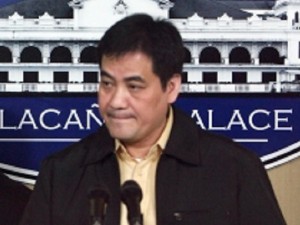Palace welcomes Japan Charter change to boost military
MANILA, Philippines–Malacañang on Wednesday welcomed the Japanese Cabinet’s reinterpretation of Japan’s pacifist Constitution that will allow the Japanese military to play a more assertive role in the region in the face of China’s aggressive expansionism in the South and East China Seas.
“I think everyone who has a stake in regional stability would certainly… support any action that would move towards promoting peace in the region,” Presidential spokesman Edwin Lacierda told a Palace press conference.
“Clearly, our belief is that Japan, by revisiting its Constitution, enables it to meet its international obligations, that is, to—in the case of the South China Sea—promote and ensure peace and stability in the region,” he added.
On a working visit to Japan last week, President Aquino expressed support for Prime Minister Shinzo Abe’s plan to revisit Article 9 of the Japanese charter, which bans the right to collective self-defense, noting that Japan’s military, known as the Self-Defense Forces, should be able to help its allies in times of need.
China example
Aquino gave as an example the Japanese military’s inability to help allies who are attacked in a peacekeeping mission. He did not mention China.
The Philippines and Japan are embroiled in territorial disputes with China.
The two countries’ geographical positions are also getting in the way of China’s island chains strategy aimed at gaining control in the Pacific area and limiting the United States’ presence in the region.
Japan is only one of two countries with which the Philippines has a “strategic partnership,” the other being the United States, which is also a Philippine treaty ally.
Japan’s Cabinet approved on July 1 a resolution that allowed the country to exercise its right to collective self-defense, a move that has given a broader military role for its Self-Defense Forces (SDF). In essence, it allows its SDF to help allies even if Japan itself was not under attack.
Direct influence
The Cabinet decision noted the changes in the security landscape and the current threats in the Asia-Pacific region that make it imperative for Japan to allow its SDF to respond to attacks.
“There exists a situation in which any threats, irrespective of where they originate in the world, could have a direct influence on the security of Japan. Furthermore, in recent years, risks that can impede the utilization of and free access to the sea, outer space and cyberspace have been spreading and become more serious. No country can secure its own peace only by itself, and the international community also expects Japan to play a more proactive role for peace and stability in the world, in a way commensurate with its national capability,” the eight-page decision said.
The Japanese Embassy furnished a copy of the Cabinet decision to the Inquirer on Wednesday.
Security challenges
The Department of Foreign Affairs (DFA) on Wednesday said the Japanese Cabinet action was a “step in the right direction.”
Reading from a statement, DFA spokesman Charles Jose said the Philippines welcomed Japan’s contributions to ensure global and regional peace and stability.
“We are confident that Japan will continue to play an important role in addressing our common security challenges,” he said.
In December 2012, Foreign Secretary Albert del Rosario said the Philippines would strongly support a rearmed Japan—its World War II invader and occupier—as a counterweight to what it sees as Chinese provocation.
“We are looking for balancing factors in the region and Japan could be a significant balancing factor,” Del Rosario told the Financial Times back in 2012.–With Christine Avendaño
